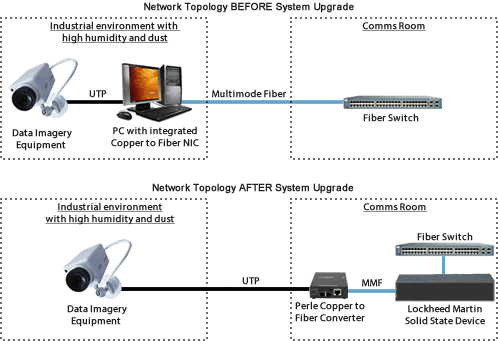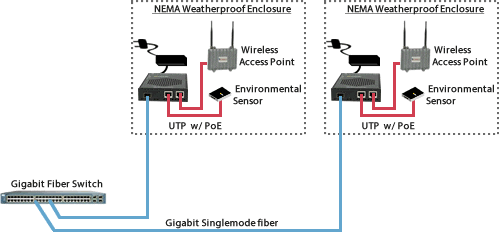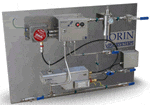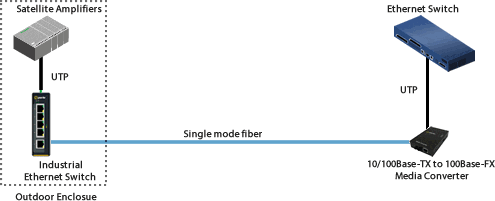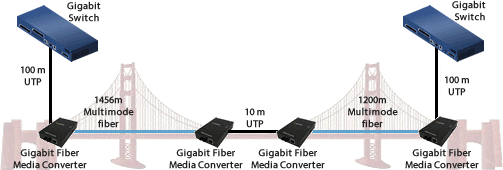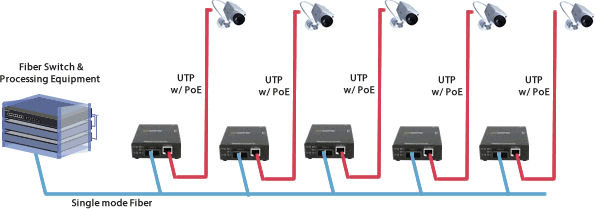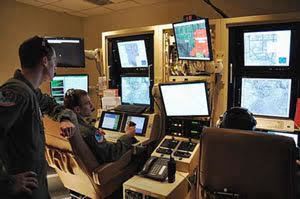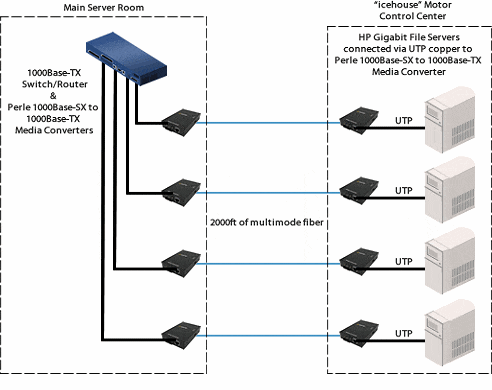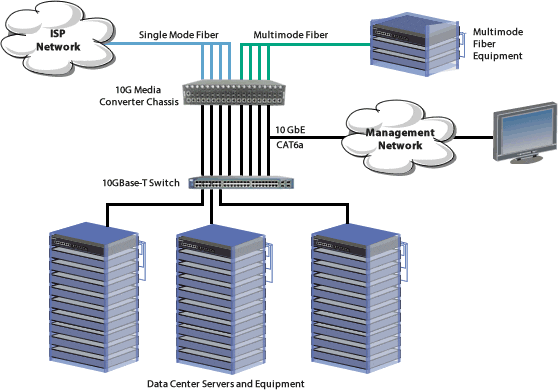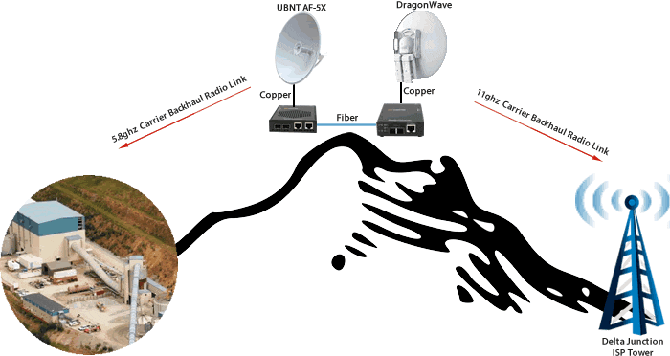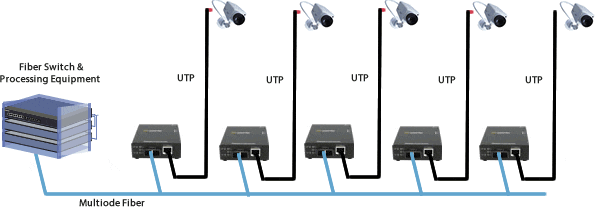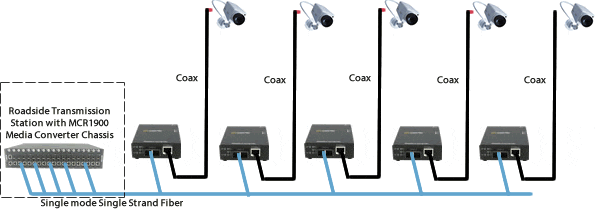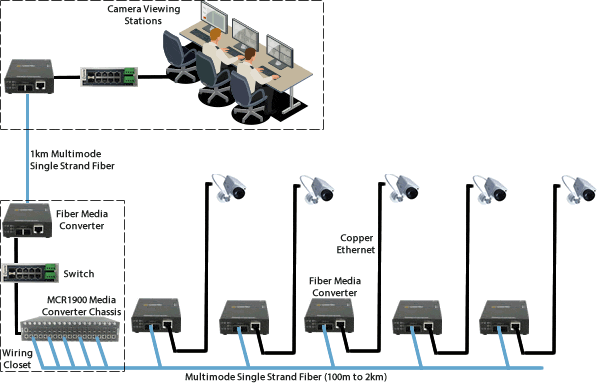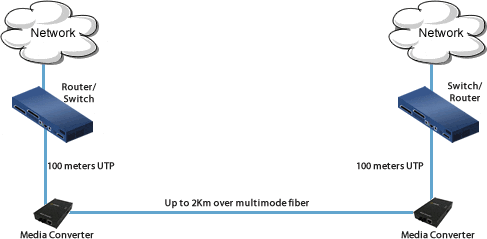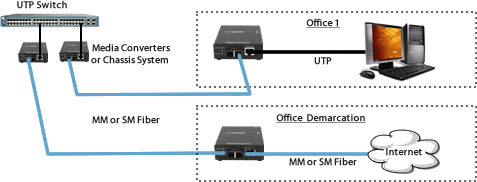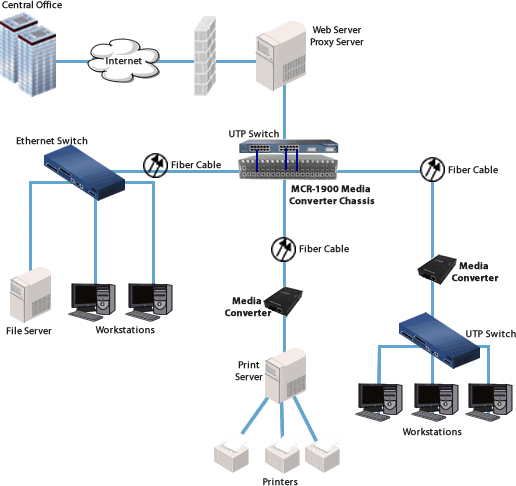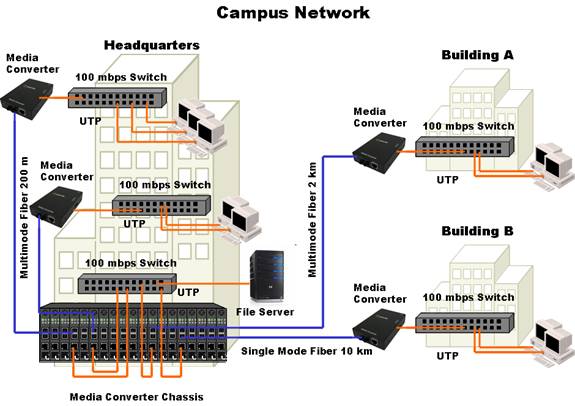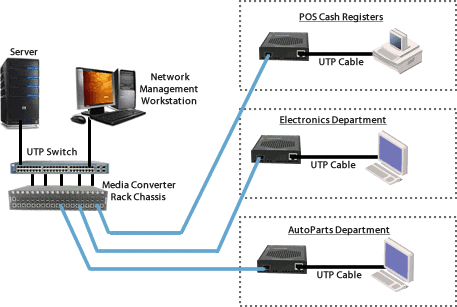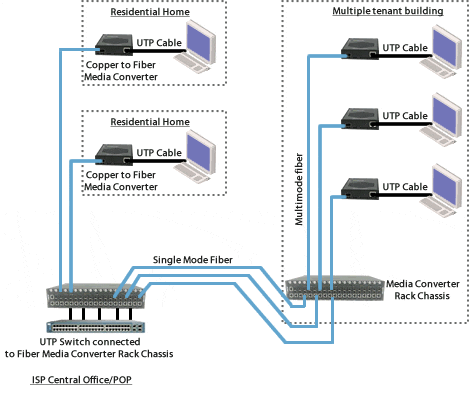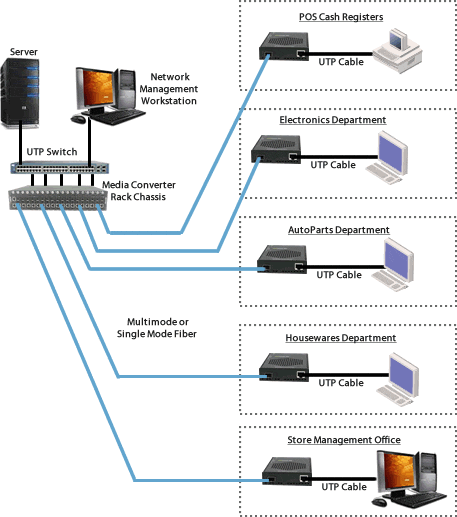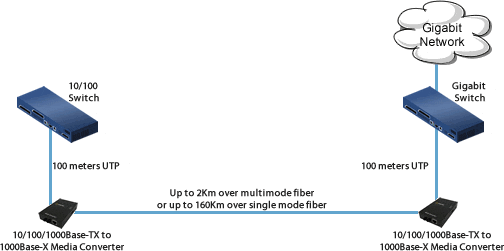SRS-1110-SFP DIN Rail Media Converters
Industrial Rate Converting Copper to Gigabit Fiber Converters
- 10/100/1000Base-T to 100/1000Base-X Fiber Media Converters
- Empty slot for Cisco and other industry standard SFPs
- Meets IEC 61850-3 & IEEE 1613 electric power substation environmental standards
- Class 1 Division 2 certified for hazardous locations
- Link copper to multimode or single mode fiber
- -40°C to +75°C (-40°F to +167°F) extended operating temperature
- Advanced Features: Link Pass-Through, Far-End Fault, Auto-MDIX
- Triple Power Input: Dual Terminal block power connector & T-Bus
The Perle SRS-1110-SFP DIN Rail Media Converter transparently connects UTP CAT5/6/7 copper to fiber in electric utility and power substation environments. With an extended operating temperature range of -40°C to +75°C and advanced electrical certifications for IEC 61850-3, IEEE1613 and EN 61000-4-16, these fiber to Ethernet converters meet all requirements necessary to operate safely in the harsh electrical environments associated with power utility and substation deployments.
The SRS Media Converters are also designed to operate in hazardous industrial locations. With numerous certifications, including ATEX Class 1 Zone 2 and ANSI/ISA 12.12.01 Class 1 Division 2, you are ensured safe and reliable operation in locations where flammable gases, liquids or vapors are handled, processed or used.
- Extend the data transmission distance of IP-based devices by connecting their 10/100/1000Base-T copper interface to Fast Ethernet or Gigabit fiber.
- Extend the distance of an existing industrial network by linking CAT5/6/7 cabling to multimode or single mode fiber.
- Extend the distance between two copper-based devices or networks
- Protect Ethernet data from EMI noise and interference by inter-connecting your copper-Ethernet devices over fiber in industrial plants.
The pluggable fiber optics port allows for flexible network configurations using SFP transceivers supplied by Perle, Cisco or other manufacturers of MSA compliant SFPs.
Network Administrators can "see-everything" with Perle's advanced features such as Auto-Negotiation, Auto-MDIX, Link Pass-Through, Fiber Fault Alert, and Loopback. This allows for more efficient troubleshooting and less on-site maintenance. These cost and time saving features, along with a lifetime warranty and free worldwide technical support, make SRS-1110-SFP Rate Converting Media Converters the smart choice for IT professionals.
SRS-1110-SFP Fiber Media Converter Features: 10/100/1000Base-T to 100/1000Base-X
| Fully designed to operate in extreme temperatures |
|
|
DIN Rail Enclosure |
Easily mount on a DIN rail or inside distribution boxes using native DIN Rail enclosure with grounding clip. No need for add-on brackets. |
|
Auto-Negotiation |
The media converter supports auto negotiation. The 1000Base-X fiber interface negotiates according to 802.3 clause 37. The 10/100/1000Base-T negotiates according to 802.3 clause 28 and 40. The 1000Base-X will link up with its partner after the highest common denominator (HCD) is reached and the copper has linked up with its partner. The 1000Base-X will continue to cycle through negotiation transmitting a remote fault of offline (provided this is enabled through the switch setting) until the copper is linked up and the HCDs match. The media converter supports auto-negotiation of full duplex, half duplex, remote fault, full duplex pause, asymmetric pause and Auto MDI-X. |
|
Auto-MDIX |
Auto-MDIX (automatic medium-dependant interface crossover) detects the signaling on the copper ethernet interface to determine the type of cable connected (straight-through or crossover) and automatically configures the connection when enabled. The media converter can also correct for wires swapped within a pair. The media converter will adjust for up to 120ns of delay skew between the 1000Base-T pairs. |
| Smart Link Pass-Through | When Smart Link Pass-Through mode is enable, the Ethernet copper port will reflect the state of the Ethernet fiber media converter port. This feature can be used whether fiber auto-negotiation is enabled or disabled. |
|
SFP Speed Sensing |
Automatically detects whether a Gigabit or Fast Ethernet fiber SFP has been inserted and adjusts accordingly. |
|
Fiber Fault Alert |
With Fiber Fault Alert the state of the Ethernet fiber receiver is passed to the Ethernet fiber transmitter. This provides fault notification to the partner device attached to the Ethernet fiber interface of the media converter. If the Ethernet fiber transmitter is off, as a result of this fault, it will be turned on periodically to allow the condition to clear should the partner device on the Ethernet fiber be using a similar technique. This eliminates the possibility of lockouts that occur with some media converters. Applies only when fiber auto-negotiation is disabled. |
|
Pause (IEEE 802.3xy) |
Pause signaling is an IEEE feature that temporarily suspends data transmission between two devices in the event that one of the devices becomes overwhelmed. The media converter supports pause negotiation on the 10/100/1000Base-T copper connection and 1000Base-X fiber connection. |
|
Duplex |
Full and half duplex operation supported. |
|
Jumbo Packets |
Transparent to jumbo packets up to 10KB. |
|
VLAN |
Transparent to VLAN tagged packets. |
|
Remote LoopBack |
Capable of performing a loopback on the 1000Base-X fiber interface. |
Hardware Specifications: SRS-1110-SFP Media Converters
Power
Input Supply Voltage
Triple voltage 12 / 24 / 48 VDC (9.6 – 60 VDC) input supporting:
- 2 x Terminal Block power input and
- 1 x T-Bus power input
Current
0.09 A (@ 24VDC)
Power Consumption
2.16 watts (@ 24VDC)
Power Connector
Dual input Terminal Block and/or T-Bus
Indicators
Power / TST
This green LED is turned on when power is applied to the media converter. Otherwise it is off. The LED will blink fast/slow when in Loopback test mode or hardware error.
Fiber link on / Receive activity (LKF)
- On: Fiber link present.
- Blinking slowly: Fiber link disabled because of copper link loss.
- Blinking quickly: Fiber link present and receiving data.
- Off: No fiber link present
Copper link on / Receive activity (LKC)
- On: Fiber link present.
- Blinking slowly: Fiber link disabled because of copper link loss.
- Blinking quickly: Fiber link present and receiving data.
- Off: No fiber link present
10/100/1000 Copper Speed (SP)
- Green: 1000 Mbps
- Yellow: 100 Mbps
- Off: 10 Mbps
Copper Link Activity (LK)
- On: Copper link is present
- Blinking quickly: Copper link receiving data
Switches - accessible by sliding the chassis open

Auto-Negotiation
- Auto (Default-Up): In this mode of operation the media converter will negotiate Ethernet parameters on both the copper and the fiber connection. This will ensure the most optimal connection parameters will be in effect. If connecting to another Perle Gigabit Media Converter, this parameter should be set to Auto.
- Off: Copper Negotiation should only be turned off, if the copper link partner does not support copper link negotiations.
SGMII
- 100/1000 (Default-Up): In this mode, the fiber characteristics will depend on the SFP inserted.
- SGMII (SFP models only): In this mode, the SFP transceiver port is able to operate with SFP’s that utilize an SGMII interface.
- Standard Mode (Default-Up): In this mode, with Fiber Negotiation set off, the links on the fiber and copper sides can be brought up and down independently of each other. A loss of link on either the fiber link or copper link can take place without affecting the other connection. However, if the Fiber Negotiation is set to Auto, then a loss of link on the copper side will result in a loss of link on the fiber side but not vice versa.
- Smart Link Pass-Through: In this mode, the link state on one connection is directly reflected through the media converter to the other connection. If link is lost on one of the connections, then the other link will be brought down by the media converter.
Loopback
- Disabled (Default-Up): The loopback feature is disabled. This is the normal position for regular operation. The switch must be set to this position for data to pass through the media converter.
- Enabled: This is a test mode. All data received on the receive (RX) fiber connection is looped back to the transmit (TX) fiber connection. The state of the copper is not relevant and no data or link status is passed through to the copper side.
Fiber Fault Alert
- Enabled (Default-Up): In this mode, when Fiber negotiation is turned on, if the media converter detects a loss of fiber signal on the fiber receiver it will immediately disable its fiber transmitter signal. This notifies the fiber link partner that an error condition exists on the fiber connection. If the remote media converter is set up for FFA Enabled and the local media converter is set up with Smart Link Pass-Through, a loss of fiber link on either the transmit or receive line will be passed through to the local copper connection to notify the connected device. If the media converter has been set to Smart Link Pass-Through mode, the effect will be the same as FFA since the link loss on the fiber receiver will result in bringing down the copper link, which will in turn cause the transmit fiber link to be brought down.
- Disabled: In this mode, the media converter will not monitor for fiber fault.
Duplex Mode
- Auto (Default-Up): In this mode, when Fiber Negotiation has been turned off, the media converter will use this Duplex setting for its Ethernet parameter negotiation on the copper connection. In the Auto position, the media converter will advertise support for both Full and Half Duplex mode. The resultant negotiation will provide the most optimum connection.
- Half: In this mode, the media converter will force the negotiation to Half Duplex mode
Copper Speed
- 100 (Default-Up): In this mode, when Auto Neg (copper) is set to off, the media converter will use this switch setting for its Ethernet copper speed connection.The media converter will force the speed to 100 Mbps.
- 10: The media converter will force the speed to 10 Mbps
Fiber Negotiation (Gigabit SFP)
- Auto (Default-Up): The Media Converter will negotiate Ethernet parameters on the fiber connection. This will ensure that the most optimal connection parameters will be in effect. If connecting to another Perle Media Converter, this parameter should be set to Auto. The Media Converter Module will advertise 1000Mbps, Full and Half Duplex, no Pause.
- Off: The Media Converter Module’s fiber will be fixed to 1000Mbps, Full Duplex.
Cables and Connectors
100Base-TX or 1000Base-T or 10/100/1000Base-T
- RJ45 connector, 2 pair CAT 5 (UTP or STP) or better cable for 10/100 Mbps
- RJ45 connector, 4 pair CAT 5 (UTP or STP) or better cable
Fixed Fiber or Small Form Factor Pluggable (SFP) slot
- SFP slot models: Empty slot for 100Base-X SFP modules supplied by Perle, Cisco or other manufacturers of MSA compliant SFPs.
- Hot insertion and removable (hot swappable).Hot insertion and removable (hot swappable).
Magnetic Isolation
1.5kv
Fiber Optic Cable
- Multimode: 62.5 / 125, 50/125, 85/125, 100/140 micron
- Single Mode: 9/125 micron (ITu-T 625)
Filtering
Filtering
1027 MAC Addresses
Frame Specifications
Buffer
1000 Kbits frame buffer memory
Size
- Maximum frame size of 10,240 bytes -- Gigabit
- Maximum frame size of 2048 bytes -- Fast Ethernet
Packet Transmission Characteristics
Bit Error Rate (BER)
<10 -12
Environmental Specifications
Operating Temperature
-40°C to 75°C (-40°F to 167°F)
Storage Temperature
-40°C to 85°C (-40°F to 185°F)
Operating Humidity
5% to 90% non-condensing
Storage Humidity
5% to 95% non-condensing
Operating Altitude
Up to 3,048 meters (10,000 feet)
Heat Output (BTU/HR)
7.37
MTBF (Hours)*
570,070 Hours
Calculation model based on MIL-HDBK-217-FN2 @ 30°C
Chassis
Molded plastic DIN Rail case with an IP20 ingress protection rating
Mounting
Din Rail Kit
Native
Product Weight and Dimensions
Weight
0.12 kg, 0.26 lbs
Dimensions
114 x 100 x 22.5mm, 4.5 x 3.9 x 0.88 inches
Packaging
Shipping Weight
0.17 kg, 0.37 lbs
Shipping Dimensions
145 x 105 x 30 mm, 5.7 x 4.1 x 1.2 inches
Regulatory Approvals
Substation & Hazloc
- IEC 61850-3
- IEEE1613
- EN 61000-4-16
- ATEX Class 1 Zone 2
- ANSI/ISA 12.12.01, Class 1 Division 2 Groups A-D
Emissions
- FCC 47 Part 15 Class A, EN55032 (CISPR32) Class A
- EN55011 (CISPR11)
- ICES-003
- EN61000-6-4 (Emissions for industrial environments)
- CISPR 32:2015/EN 55032:2015 (Class A)
- CISPR 24:2010/EN 55024:2010
- EN61000-3-2
Immunity
- EN55027
- EN 61000-4-2 (ESD)
- EN 61000-4-3 (RS)
- EN 61000-4-4 (EFT)
- EN 61000-4-5 (Surge)
- EN 61000-4-6 (CS)
- EN 61000-4-8 (PFMF)
- EN 61000-4-11
- IEC/EN 61000-6-2 (General Immunity for Industrial Environments)
Safety
- UL/EN/IEC 62368-1 (previously 60950-1)
- CAN/CSA C22.2 No. 62368-1
- UL/IEC 61010-1
- UL/IEC 61010-2
- CE
Environmental
Other
- ECCN: 5A991
- HTSUS Number: 8517.62.0020
- Perle Limited Lifetime Warranty
Application Diagrams
Gigabit to IP Cameras
Extend the reach to IP cameras using industrial fiber media converters. Security cameras are typically installed in remote locations where extremely high or low temperatures are a concern -- ceilings, rooftops, light poles, along fences, pipelines and transit routes.
Stand-alone Media Converters are placed at the remote end connecting cameras with copper interfaces to fiber optic cabling. The fiber can extend the distance up to 10 kilometers using single mode or multimode fiber back to a control center. A media converter chassis located in the data closet at the control center accepts the fiber signal, converts it, and connects to the copper equipment at the main site.

Gigabit Fiber to Wireless Access Points
Extend the reach to wireless access points ( AP ) using fiber media converters. When a company deploys a wireless network, APs need to be set up throughout the facility to ensure complete coverage for reliability. The network manager will likely need to extend further than the 100 meters allowed by copper cable to reach many of the APs.
When APs are used in industrial environments Media Converters are placed at the remote end connecting APs with copper interfaces to fiber optic cabling. The fiber can extend the distance up to 10 kilometers using single mode or multimode fiber back to a control center. A media converter chassis located in the data closet at the control center accepts the fiber signal, converts it, and connects to the copper equipment at the main site.

Bridge 10/100 Devices to gigabit Backbone
Industrial switches are often used in environments where extremely high or low temperatures are a concern. Devices in an industrial environment can be connected to a Gigabit backbone through the use of rate converting Industrial Media Converters.

UTP Switch to Fiber Switch
A media converter can interconnect a UTP copper based Switch port to a remote switch that has integrated fiber.

Switch to Gigabit Server
Two Ethernet Media Converters can extend the distance between a Switch and a File Server across a fiber link up to 10Km in length.

Direct Connect - Long Distance
With a pair of Media Converters two devices, such as file servers, can be connected up to 10km away across a fiber link.

Enterprise Infrastructure
Create a fiber infrastructure for your enterprise network without any wholesale replacement of existing copper-based equipment.


Part Number: 05092080
SRS-1110-SFP- 10/100/1000 Industrial Media and Rate Converter: 10/100/1000BASE-T (RJ-45) [100 m/328 ft] to 1000BASE-X or 100BASE-X- SFP Slot (empty)- Ruggedized to IEC 61850-3/IEEE 1613, -40F to +167F (-40C to +75C) extended operating temperature support. DIN Rail case, terminal block (Combicon) power connector for external power source

Contact Perle Sales
Purchase from our E-Store
Find A Distributor
Related Accessories




